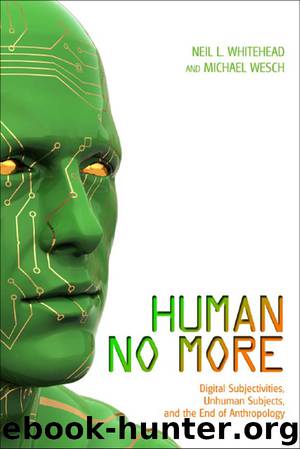Human No More by Neil L. Whitehead & Michael Wesch

Author:Neil L. Whitehead & Michael Wesch
Language: eng
Format: epub
Publisher: University Press of Colorado
Published: 2012-03-24T16:00:00+00:00
INTERLUDE
Radhika (age 50):
In the mid-1980s, when small businesses that previously offered typewriter tutorials began to provide computer training, I was compelled to sign up. As a housewife, freelance writer/amateur poet, and mother of a toddler who was fascinated with his mother’s typewriting, I sought to improve myself by going to computer tutorials. I learned early programs such as Word, BASIC, COBOL, and a smattering of Fortran. I have read books about artificial intelligence and “Eliza” (http://www.knowledgerush.com/kr/encyclopedia/ELIZA/) and hoped to have the computer spit out poetry for me as well. As I learned more about computers, the punch cards that I had often stumbled across in my brother’s strewed belongings when he came home for vacation from his IIT campus began acquiring historical significance to me. Later these punch cards acquired even more significance as I realized their similarity to the cards on the Jacquard loom as I began examining offline and online technologies in global/local contexts. Little did I know that in my search for magic and in my laziness, I was to stumble upon complex, nuanced intersections of science, technology, text, image, subjectivity, and gendered spaces of technocultures. I did not know it then, but the business that offered these tutorials was training the future offshore labor forces for transnational businesses.
Globalization in digital formats had arrived in my backyard in Bhopal, India, in the mid-1980s. Thinking historically, it is no surprise that the infamous Bhopal gas tragedy (in December 1984), resulting from manufacturing industries offshoring outmoded technologies to third-world urban spaces, signaled a transition into a different phase in globalization. The resulting globalization appeared more sanitized and benevolent, even as more manufacturing jobs and computer hardware factories continued to be moved into borderlands (maquiladoras) and other third-world regions, because this move was virtually invisible in the clamor of the digital. Thus, as audiences the world over watched the broadcast of this disaster and made meaning, protesting the transfer of outmoded technologies, the focus of communication scholars conveniently shifted to examining empowerment through information technology (IT).
Download
This site does not store any files on its server. We only index and link to content provided by other sites. Please contact the content providers to delete copyright contents if any and email us, we'll remove relevant links or contents immediately.
Cecilia; Or, Memoirs of an Heiress — Volume 1 by Fanny Burney(32536)
Cecilia; Or, Memoirs of an Heiress — Volume 2 by Fanny Burney(31934)
Cecilia; Or, Memoirs of an Heiress — Volume 3 by Fanny Burney(31925)
The Great Music City by Andrea Baker(31909)
We're Going to Need More Wine by Gabrielle Union(19030)
All the Missing Girls by Megan Miranda(15921)
Pimp by Iceberg Slim(14476)
Bombshells: Glamour Girls of a Lifetime by Sullivan Steve(14046)
For the Love of Europe by Rick Steves(13850)
Talking to Strangers by Malcolm Gladwell(13339)
Norse Mythology by Gaiman Neil(13331)
Fifty Shades Freed by E L James(13227)
Mindhunter: Inside the FBI's Elite Serial Crime Unit by John E. Douglas & Mark Olshaker(9312)
Crazy Rich Asians by Kevin Kwan(9271)
The Lost Art of Listening by Michael P. Nichols(7485)
Enlightenment Now: The Case for Reason, Science, Humanism, and Progress by Steven Pinker(7303)
The Four Agreements by Don Miguel Ruiz(6737)
Bad Blood by John Carreyrou(6608)
Weapons of Math Destruction by Cathy O'Neil(6260)
